香港朗文4B五单元
香港朗文4B单词及句子(最新整理)

朗文4B单词及句型Chapter 1 Join our club 参加我们的俱乐部一、四会单词join (join us)club Drama Club Sports Club加入(加入我们)俱乐部戏剧俱乐部体育俱乐部Gardening Club get fit keep fit find out园艺俱乐部变得健康保持健康了解,查出play music make music have fun come on演奏音乐制作音乐玩得开心来吧,加油act out a play dress up because improve (your English)表演话剧盛装,打扮因为提高(你的英语)pet interest grow take care of宠物兴趣种植照顾二、三会单词turn to healthy poster aplication forms转向健康的海报申请表choose learn hand in suggest选择学习上交建议三、重点句型1.Which club do you want to join?你想参加什么俱乐部?I want to join the …club.2.Why do you want to join … club?你为什么想参加……俱乐部?Because I like …ing.因为我喜欢……Because I want to + 动词原形因为我想……3.It's time to + 动词原形该干……了。
4.I quite like English.我相当喜欢英语。
But I like drama best.但是我最喜欢戏剧。
5.Let's join …咱们来加入……Chapter 2 Rules in fun places 在游乐场所的规则一、四会单词rule turn off must (mustn’t)keep quiet sign规则关掉必须(禁止)保持安静标牌Litter (No littering)spit (No spitting)dive (No diving)drive 扔垃圾(禁止扔垃圾)吐痰(禁止吐痰)跳水(禁止跳水)驾驶No running light a fire rock pick flowers spoil禁止奔跑生火岩石摘花损坏二、三会单词attendant country park in motion arrive接待员郊野公园移动到达hill view peaceful bench小山景色平静的长椅radio car flush shoplifting keep off遥控车冲(厕所)在商店偷窃不要接近shine run up to in case of good try照耀跑过来如果干得好mobile phone have to stop doing have a good time 手提电话必须停止做玩得高兴三、重点句型1.No + doing 公共场合的标语,用来警示他人。
最新香港朗文4B第五单元知识要点 词汇语法

朗文4B Chapter5背诵内容一、单词1. spaghetti /spəˈgetɪ/ n. 意大利面(pasta的一种)2.pasta /'pɑːstə//ˈpæstə/ n. 意大利面3.Italy /'ɪtəlɪ/ n. 意大利4.America /ə'merɪkə/ n. 美国5.France /frɑ:ns/ n. 法国French /frentʃ/ n. 法国的6. Japan /dʒəˈpæn/ n. 日本7. China /ˈtʃaɪnə/ n. 中国8. snail /sneɪl/ n.蜗牛9.hamburger /ˈhæmbɜ:gə/ n. 汉堡包10.pizza /ˈpi:tsə/n.披萨11.bread /bred/n. 面包12.spicy /ˈspaɪsɪ/ adj. 辣的13.roast /rəʊst/ adj. 烤好的,烤制的14. fair/ feə /n. 集市,庙会;展览会15. stall /stɔːl/n. 货摊16. delicious /dɪ'lɪʃəs/ adj. 美味的,可口的17. Thailand /'taɪlænd/ n. 泰国18. crunchy /'krʌntʃɪ/ adj. 脆的,吃上去嘎吱嘎吱的19. offer /ˈɒfə/ v. 提供,给予20. satay /ˈsɑ:teɪ/ n. (马来西亚、印度尼西亚的)加香烤肉;沙嗲21. Malaysia / mə'leɪʒə/ n. 马来西亚22. Africa /'æfrɪkə/ n. 非洲23. frighten /'fraɪtn/ v. 惊吓24.India /'ɪndɪə/ n. 印度25.curry /ˈkʌrɪ/ n. 咖喱食品26.sushi /ˈsu:ʃɪ/ n. 寿司,生鱼片冷饭团;27.treat /triːt/ n. 款待、招待kshake /ˈmɪlkʃeɪk/ n. 奶昔29.prawn /prɔ:n/ n. 对虾二、词组1.at the International Food Festival 在国际食品节2.food from around the world=food from all over the world世界各地的美食3.be made from…由……制作(化学变化, 不能看到材料本身)be made of…由……制作(物理变化,能看到材料本身)be made in …在……生产4.hot dog 热狗5.roast duck 烤鸭6.dim sum 点心7.cold noodles 冷面8.French bread 法式面包9.soy sauce 酱油/sɔɪ/ /sɔːs/10.a bread roll 一只面包卷11.a food fair 一场食品博览会12.taste new kinds of food 品尝新款食物13.at a stall 在一个摊位上14.honey pot ants 蜜罐蚂蚁15.South America 南美16.go to another stall 去另一个摊位17.fried grasshopper 油炸蚱蜢18.have a really interesting time 玩得很高兴,度过美妙的时光19.at the fair 在集市上20.get home=arrive home 到家21.tell their mother about the insects 告诉他们妈妈关于昆虫的事22.buy sb. a present=buy a present for sb. 为某人买一件礼物23.look a bit worried 看上去有一些焦虑24.a can of worms 一罐蠕虫25.frighten her mother 惊吓她的妈妈26.food items /'aɪtəm/ 食物. 食品27. a food court 美食广场28. chicken curry 咖喱鸡29. picky eater 挑食的人30. sandwiches made with ham 火腿制成的三明治三、重点语法1.--Shall we try some spaghetti/ hot dogs/…?--Good idea. / Sorry.shall是情态动词,用在问句中,用来征询对方对于主语行动的意见,如要求对方提供帮助、提出建议或给予指示和征求意见, 主要用于第一(I和We)人称。
(完整版)香港朗文4B单词及句子

朗文4B单词及句型Chapter 1 Join our club参加我们的俱乐部一、四会单词join (join us) club Drama Club Sports Club加入(加入我们)俱乐部戏剧俱乐部体育俱乐部Gardening Club get fit keep fit find out园艺俱乐部变得健康保持健康了解,查出play music make music have fun come on演奏音乐制作音乐玩得开心来吧,加油act out a play dress up because improve (your English) 表演话剧盛装,打扮因为提高(你的英语)pet interest grow take care of宠物兴趣种植照顾二、三会单词turn to healthy poster aplication forms转向健康的海报申请表choose learn hand in suggest选择学习上交建议三、重点句型1. Which club do you want to join? 你想参加什么俱乐部?I want to join the …club.2. Why do you want to join … club? 你为什么想参加……俱乐部?Because I like …ing.因为我喜欢……Because I want to + 动词原形因为我想……3. It's time to + 动词原形该干……了。
4. I quite like English. 我相当喜欢英语。
But I like drama best. 但是我最喜欢戏剧。
5. Let's join …咱们来加入……Chapter 2 Rules in fun places在游乐场所的规则一、四会单词rule turn off must (mustn’t)keep quiet sign规则关掉必须(禁止)保持安静标牌Litter (No littering) spit (No spitting) dive (No diving) drive 扔垃圾(禁止扔垃圾)吐痰(禁止吐痰)跳水(禁止跳水)驾驶No running light a fire rock pick flowers spoil 禁止奔跑生火岩石摘花损坏二、三会单词attendant country park in motion arrive接待员郊野公园移动到达hill view peaceful bench小山景色平静的长椅radio car flush shoplifting keep off遥控车冲(厕所)在商店偷窃不要接近shine run up to in case of good try照耀跑过来如果干得好mobile phone have to stop doing have a good time 手提电话必须停止做玩得高兴三、重点句型1. No + doing 公共场合的标语,用来警示他人。
朗文香港4B chap5-3
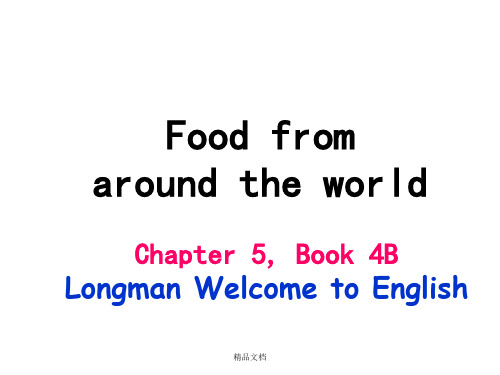
精品文档
Review the story
精品文档
精品文档
精品文档
精品文档
精品文档
精品文档
Review words:
taste
stall
kinds of
精品文档
Fried grasshopper
delicious
crunchy
精品文档
salty frighten
worm
精品文档
精品文档
精品文档
This / That
this A thing which is near to you
that A thing which is far from you
精品文档
These / Those
these things which are near to you
those
things which are far from you
精品文档
What are those / is that?
They’re / It is ….. Where do they / does it Come from?. They come / It comes from…. Yes, please. /No, than
精品文档
salty
Taste
Charlie and Cherry went to a ____. First, they tasted ________ come from________. They thought these food are ____________. Then Charlie tasted _______come from_______, He thought it’s ________. Cherry tried one too.
朗文香港4B chap5-2幻灯片

It tastes like chocolate... 它吃起来像巧克力。
stall
he sells fruits at a market stall. 她在市场的货摊上卖水果。
20
New words: kinds of
delicious
Who cooked this? It's delicious. 谁做的?味道好极了。
Food from around the world
Chapter 5, Book 4B Longman Welcome to English
1
Where does it/ do they come from? It comes / They come from ….
hotdogs hamburgers
Moths
Bees
Wasps
cicada pupa
Ants
10
Beetles
Grasshoppers Backswimmers
Locusts
Stinkbugs
Crickets
11
How do we cook insects?
roasting frying
boiling
12
What’s the most unusual food you have ever tried?
26
Q1: Did Charlie and Cherry like the insects they tried? Q2: How did the honey pot ants taste? Q3: How did the fried grasshoppers taste?
27
Q4: Why was their mother surprised when they got home? Q5: Why did Cherry tell her mother the worms were chocolate ones?
朗文新思维 4B Chapter 5 Food around the world知识单
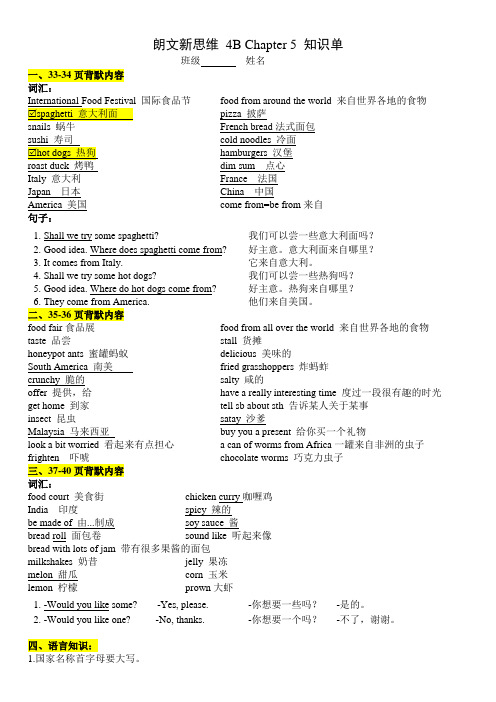
朗文新思维4B Chapter 5 知识单班级姓名__________一、33-34页背默内容词汇:国际食品节food from around the world 来自世界各地的食物pizza 披萨French bread法式面包cold noodles 冷面hamburgers 汉堡roast duck 烤鸭dim sum 点心Italy 意大利France 法国Japan 日本China 中国America 美国come from=be from来自句子:二、35-36页背默内容food fair食品展food from all over the world 来自世界各地的食物taste 品尝stall 货摊honeypot ants 蜜罐蚂蚁delicious 美味的South America 南美fried grasshoppers 炸蚂蚱crunchy 脆的salty 咸的offer 提供,给have a really interesting time 度过一段很有趣的时光get home 到家tell sb about sth 告诉某人关于某事insect 昆虫satay 沙爹Malaysia 马来西亚buy you a present 给你买一个礼物look a bit worried 看起来有点担心 a can of worms from Africa一罐来自非洲的虫子frighten 吓唬chocolate worms 巧克力虫子三、37-40页背默内容词汇:food court 美食街chicken curry咖喱鸡India 印度spicy 辣的be made of 由...制成soy sauce 酱bread roll 面包卷sound like 听起来像bread with lots of jam 带有很多果酱的面包milkshakes 奶昔jelly 果冻melon 甜瓜corn 玉米lemon 柠檬prown大虾四、语言知识:1.国家名称首字母要大写。
香港朗文4BChapter5Foodfromaroundtheworld教学设计
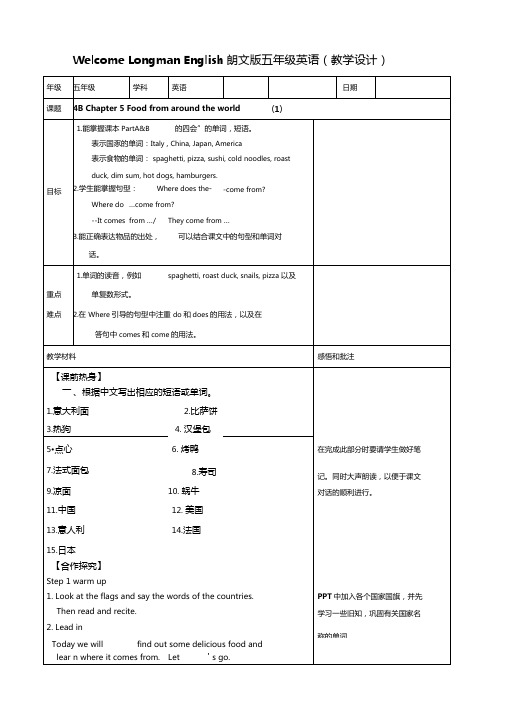
hot doghamburger
roast duckdim sum
cold noodleFrench bread
sn ailsu shi
cola
二、用所给单词的正确形式填空。
1.Where does it(come) from?
2.Where(do) they come from?
that/ this的用法,those/these的区别。
Would you like some ?与Would you like to do sth.?
的区别和用法。
They are与It is的区别。
Step 3 Con solidati on
Do some exercise to help stude nts to un dersta nd very
Welcome Longman English
年级
五年级
学科
英语
日期
课题
4B Chapter 5 Food from around the world
(1)
1.能掌握课本PartA&B
的四会”的单词,短语。
表示国豕的单词:Italy,China, Japan, America
表示食物的单词:spaghetti, pizza, sushi, cold noodles, roast
well.
What' s this? It's chicken curry.
单数与复数的主语人称变化属于
What are those? They are hot dogs.
细节。
Step 4 Sum-up
引导学生总结本节课学习的内容。
香港朗文小学英语Longman-book4B-Chapter5PPT 课件

Uncountable nouns
Practice
Roast duck __c_o_m_e_s_f_r_o_m__ China. Would you like ___so_m_e___? No, thanks.
Malaysia America France
Italy Japan China
Where do hamburgers come from? They come from America.
pizza sushi satay hamburgers snails dim sum
Malaysia America France
pizza sushi satay hamburgers snails dim sum
Malaysia America France
Italy Japan China
Where does satay come from? It comes from Malaysia.
pizza sushi satay hamburgers snails dim sum
Italy Japan China
Where do snails come from? They come from France.
pizza sushi satay hamburgers snails dim sum
Malaysia America France
Italy Japan China
Would you like some spaghetti? Yes, please. No, thanks.
Hamburgers come from America. Would you like one?
(完整版)香港朗文5B各单元关键内容与练习(1)
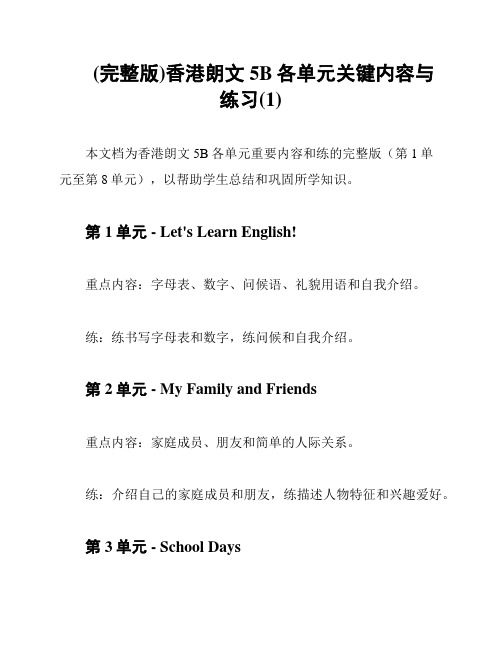
(完整版)香港朗文5B各单元关键内容与练习(1)本文档为香港朗文5B各单元重要内容和练的完整版(第1单元至第8单元),以帮助学生总结和巩固所学知识。
第1单元 - Let's Learn English!重点内容:字母表、数字、问候语、礼貌用语和自我介绍。
练:练书写字母表和数字,练问候和自我介绍。
第2单元 - My Family and Friends重点内容:家庭成员、朋友和简单的人际关系。
练:介绍自己的家庭成员和朋友,练描述人物特征和兴趣爱好。
第3单元 - School Days重点内容:学校设施、课程和常见用语。
练:练描述学校设施,介绍自己的校园生活,简单的口头表达。
第4单元 - Animals and Nature重点内容:动物、植物和环境。
练:介绍自己喜欢的动物、植物和自然景观,练口头表达。
第5单元 - Fun and Games重点内容:游戏和娱乐活动。
练:介绍自己喜欢的游戏或娱乐活动,练口头表达和简单的书面交流。
第6单元 - Festivals and Celebrations重点内容:节日和庆祝活动。
练:介绍自己喜欢的节日和庆祝活动,练口头表达和简单的书面交流。
第7单元 - Our World重点内容:世界地理和文化差异。
练:介绍自己居住的城市或国家,了解不同的文化,练口头表达和简单的书面交流。
第8单元 - Health and Fitness重点内容:健康和体育锻炼。
练:介绍自己的饮食健康和体育锻炼惯,练口头表达和简单的书面交流。
以上是香港朗文5B各单元的重点内容和练习,希望可以为学生的英语学习提供帮助。
朗文香港4B chap5-2(课堂PPT)

.
25
Sentence pattern
offer sb. sth.
Ex: He offered Cherry a fried grasshopper too. Rhys offered him an apple
show sb. sth.
Ex: A man showed Charlie some fried grasshopper I showed them where the gun was...
he sells fruits at a market stall. 她在市场的货摊上卖水果。
.
20
New words: kinds of
delicious
Who cooked this? It's delicious. 谁做的?味道好极了。
.
21
Fried grasshopper
.
22
crunchy
worm
The bird had a worm in its beak. 鸟儿嘴里叼着一条虫。
.
24
look worried
Mrs. Chow looked a bit worried. My sister and I do not look alike.
can
It was always canned peas for Sunday lunch.
Food from around the world
Chapter 5, Book 4B Longman Welcome to English
.
1
Where does it/ do they come from? It comes / They come from ….
朗文4BChapter5
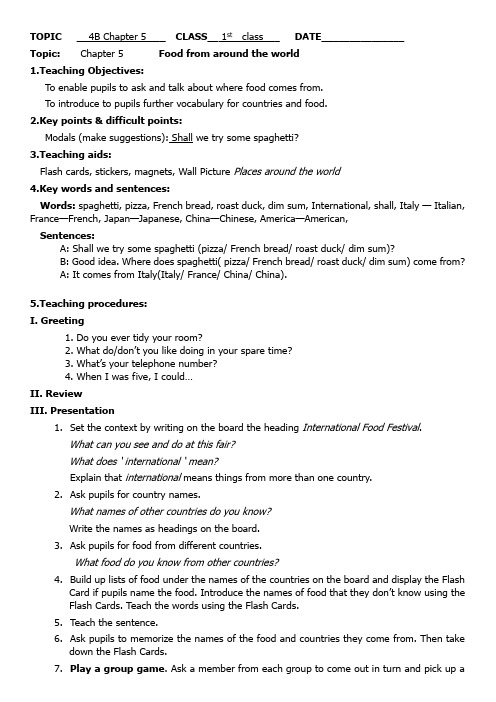
TOPIC __4B Chapter 5___ CLASS__ 1st class___ DATE_______________Topic: Chapter 5 Food from around the world1.Teaching Objectives:To enable pupils to ask and talk about where food comes from.To introduce to pupils further vocabulary for countries and food.2.Key points & difficult points:Modals (make suggestions): Shall we try some spaghetti?3.Teaching aids:Flash cards, stickers, magnets, Wall Picture Places around the world4.Key words and sentences:Words: spaghetti, pizza, French bread, roast duck, dim sum, International, shall, Italy — Italian, France—French, Japan—Japanese, China—Chinese, America—American,Sentences:A: Shall we try some spaghetti (pizza/ French bread/ roast duck/ dim sum)?B: Good idea. Where does spaghetti( pizza/ French bread/ roast duck/ dim sum) come from?A: It comes from Italy(Italy/ France/ China/ China).5.Teaching procedures:I. Greeting1. Do you ever tidy your room?2. What do/don’t you like doing in your spare time?3. What’s your telephone number?4. When I was five, I could…II. ReviewIII. Presentation1.Set the context by writing on the board the heading International Food Festival.What can you see and do at this fair?What does ‘ international ‘ mean?Explain that international means things from more than one country.2.Ask pupils for country names.What names of other countries do you know?Write the names as headings on the board.3.Ask pupils for food from different countries.What food do you know from other countries?4.Build up lists of food under the names of the countries on the board and display the FlashCard if pupils name the food. Introduce the names of food that they don’t know using the Flash Cards. Teach the words using the Flash Cards.5.Teach the sentence.6.Ask pupils to memorize the names of the food and countries they come from. Then takedown the Flash Cards.7.Play a group game. Ask a member from each group to come out in turn and pick up aFlash Card. Ask them questions about each Flash Card they pick up, e.g.T: What’s this?P: It’s spaghetti.T: Where does spaghetti come from?P: It comes from …Then pupils to put the Flash Card under the correct country heading. Give points for correct answers.8.Play a game: Bang!Materials: Small piece of paper, shoe box or coffee can. Write words on pieces of paper and fold them in half (sight words, vocab, blends etc.). Also add a few cards that say "BANG!". Ss take turns picking cards and if they read the word correctly they get to keep the word. If they draw a BANG! card they yell BANG! and then return all their cards (except the BANG! card) to the can/box.9.Ask pupils to look at page 33 of the Longman Book, then point and read it.IV. Homework:6. Blackboard Design:7. Teacher’s Summary & Notes:。
(完整版)香港朗文4B复习提要
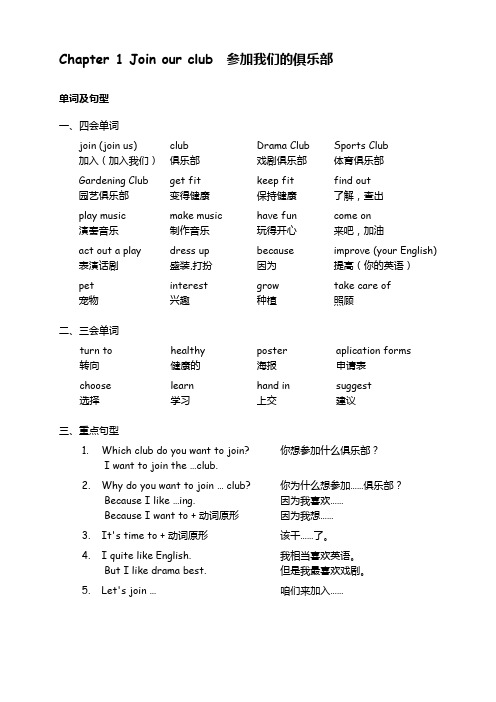
Chapter 1 Join our club参加我们的俱乐部单词及句型一、四会单词join (join us) club Drama Club Sports Club加入(加入我们)俱乐部戏剧俱乐部体育俱乐部Gardening Club get fit keep fit find out园艺俱乐部变得健康保持健康了解,查出play music make music have fun come on演奏音乐制作音乐玩得开心来吧,加油act out a play dress up because improve (your English) 表演话剧盛装,打扮因为提高(你的英语)pet interest grow take care of宠物兴趣种植照顾二、三会单词turn to healthy poster aplication forms转向健康的海报申请表choose learn hand in suggest选择学习上交建议三、重点句型1. Which club do you want to join? 你想参加什么俱乐部?I want to join the …club.2. Why do you want to join … club? 你为什么想参加……俱乐部?Because I like …ing.因为我喜欢……Because I want to + 动词原形因为我想……3. It's time to + 动词原形该干……了。
4. I quite like English. 我相当喜欢英语。
But I like drama best. 但是我最喜欢戏剧。
5. Let's join …咱们来加入……I. 四会单词Drama Club 戏剧俱乐部Sports Club 体育俱乐部English Club 英语俱乐部Music Club音乐俱乐部Art Club 艺术俱乐部Gardening Club 园艺俱乐部have fun 玩得愉快keep fit 保持健康get fit 变得健康improve 提高join 加入注意:1. get fit 是变健康,是一个变化的过程,而 keep fit 是指在已经健康的情况下,继续保持健康,两者有区别。
香港朗文版小学英语教材各册目录
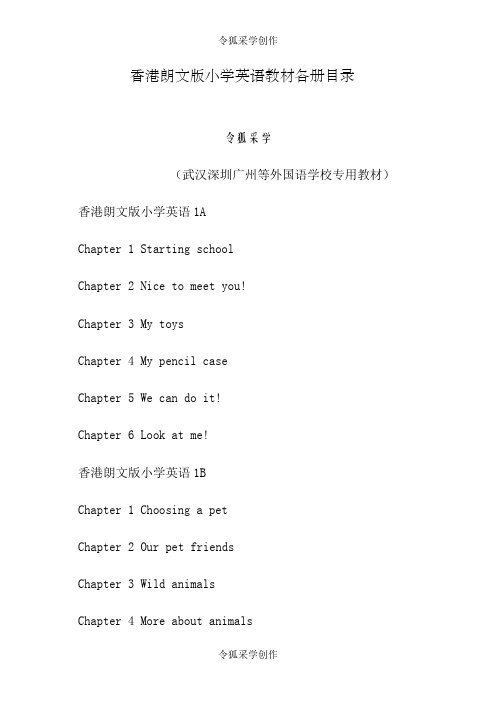
香港朗文版小学英语教材各册目录令狐采学(武汉深圳广州等外国语学校专用教材)香港朗文版小学英语1AChapter 1 Starting schoolChapter 2 Nice to meet you!Chapter 3 My toysChapter 4 My pencil caseChapter 5 We can do it!Chapter 6 Look at me!香港朗文版小学英语1BChapter 1 Choosing a petChapter 2 Our pet friendsChapter 3 Wild animalsChapter 4 More about animalsChapter 5 Happy moments Chapter 6 A fashion show香港朗文版小学英语2AChapter 1 Coming to school Chapter 2 About meChapter 3 People who help me Chapter 4 People at work Chapter 5 Signs we see Chapter 6 Places in the park 香港朗文版小学英语2BChapter 1 Buying snacks Chapter 2 Ourfavourite food Chapter 3 My dayChapter 4 Helping at home Chapter 5 Sports we like Chapter 6 Activities we like香港朗文版小学英语3AChapter 1 Weather and seasons Chapter 2 Festivals we like Chapter 3 Our school events Chapter 4 At the school fair Chapter 5 Things at home Chapter 6 A trip to the beach 香港朗文版小学英语3BChapter 1 Open dayChapter 2 Helping others Chapter 3 CampingChapter 4 In the holidays Chapter 5 Our bodiesChapter 6 When I was young香港朗文版小学英语4AChapter 1 Knowing our friendsChapter 2 More about our friendsChapter 3 When our grandparents were young Chapter 4 Five hundred years agoChapter 5 Animals big and smallChapter 6 Wonderful placesChapter 7 Ricky learns a lesson香港朗文版小学英语4BChapter 1 Join our clubChapter 2 Roles in fun placesChapter 3 Holiday plans in Hong KongChapter 4 A visit to Hong KongChapter 5 Food from around the worldChapter 6 Ordering foodChapter 7 The Choc-a-Rock Banana-Rama Cake香港朗文版小学英语5AChapter 1 Changes at homeChapter 2 Turning over a new leaf Chapter 3 What's the matter? Chapter 4 Lending a handChapter 5 Favourite Festivals Chapter 6 A public hoilday Chapter 7 JPC in action香港朗文版小学英语5BChapter 1 TeamworkChapter 2 Exciting experiences Chapter 3 Eating habitsChapter 4 Advice on eating Chapter 5 Enjoying nature Chapter 6 Help save the animals Chapter 7 The new Cinderella香港朗文版小学英语6AChapter 1 When I grow upChapter 2 My hobbies over the years Chapter 3 Our polluted planetChapter 4 Help save the earthChapter 5 Shoppers' paradiseChapter 6 Special peopleChapter 7 Can you keep a secret?香港朗文版小学英语6BChapter 1 Study toursChapter 2 Exploring LondonChapter 3 Getting adviceChapter 4 Coping with problemsChapter 5 An interview for a new school Chapter 6 Memories of school life Chapter 7 Our graduation ceremony。
香港朗文4B 5-6单元
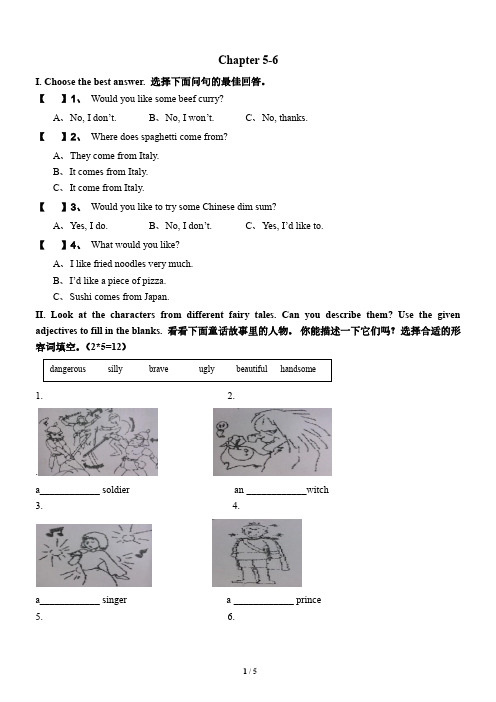
Chapter 5-6I. Choose the best answer. 选择下面问句的最佳回答。
【 】1、 Would you like some beef curry?A 、No, I don ’t.B 、No, I won ’t.C 、No, thanks.【 】2、 Where does spaghetti come from?A 、They come from Italy.B 、It comes from Italy.C 、It come from Italy.【 】3、 Would you like to try some Chinese dim sum?A 、Yes, I do.B 、No, I don ’t.C 、Yes, I ’d like to.【 】4、 What would you like?A 、I like fried noodles very much.B 、I ’d like a piece of pizza.C 、Sushi comes from Japan.II. Look at the characters from different fairy tales. Can you describe them? Use the given adjectives to fill in the blanks. 看看下面童话故事里的人物。
你能描述一下它们吗?选择合适的形容词填空。
(2*5=12)1. 2. .a____________ soldier an ____________witch3.4.a____________ singer a ____________ prince5. 6. dangerous silly brave ugly beautiful handsomea____________pig a____________ tigerIII. Finish the sentences with a, an or some. Use X if no word is needed.用a,an或者some完成下面的句子,如果不需要就打X。
朗文香港4Bchap5_1
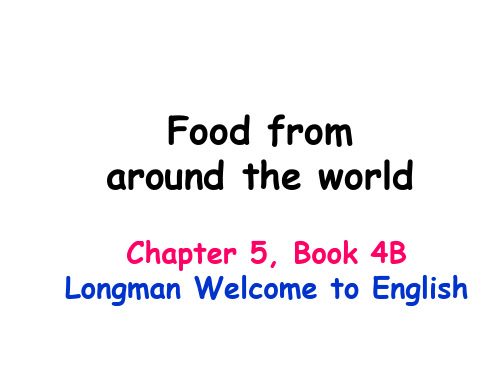
Where do snails come from? They come from France.
pizza sushi satay hamburgers snails dim sum
Malaysia America France
Italy Japan China
Shall we go to Ocean Park?
Shall : As a Auxiliary.
The future tense : I /we shall /will + verb.
Ex: I shall study harder at English. 我将更加努力地学习英语。
He will go to Shanghai. 他要去上海。
Would you like some spaghetti? Yes, please. No, thanks.
Hamburgers come from America. Would you like one?
Countable nouns
Snails come from France. Would you like some?
Giving offers
Giving offers
Giving offers
We use Would you like … ? when we are offering something to someone in a polite way. Would you like = Do you want
pizza sushi satay hamburgers snails dim sum
Malaysia America France
- 1、下载文档前请自行甄别文档内容的完整性,平台不提供额外的编辑、内容补充、找答案等附加服务。
- 2、"仅部分预览"的文档,不可在线预览部分如存在完整性等问题,可反馈申请退款(可完整预览的文档不适用该条件!)。
- 3、如文档侵犯您的权益,请联系客服反馈,我们会尽快为您处理(人工客服工作时间:9:00-18:30)。
寿司“SUSHI”、“酸”即是酸腌制的食物。在公元200年即后汉年代,中国已开始流传“寿司”这种食 品,在辞典中的解释为以盐、醋、米及鱼腓制而成的食品,宋朝年间,中国战乱频仍,寿司正好为逃难的充饥 食品,而品种更多,由菜蔬类,鱼类,肉类,甚至贝壳类都有。公元700年,即奈良年代,出外营商的日本商旅 将寿司流传入日本,当时的日本人,用一些醋腌制过的饭团,加上一些海产或肉类,压成一小块,整齐地排列在 一个小木箱之内,作为沿途的食粮。直到公元1700年,即江户年间,寿司才于日本广泛流传,经久不衰,成为 一种普通美味的食品。并受到人们的欢迎。。。
Malaysia
America France Italy
Japan
China
dim sum
pizza sushi
Malaysia America France Italy
satay hamburgers
snails
Japan
China
dim sum
It comes from Italy.
Where does pizza come from?
pizza sushi
Malaysia America France Italy
satay hamburgers
snails
Japan
China
dim sum
It comes from Japan.
Where does sushi come from?
pizza sushi
Malaysia America France Italy
We use Would you like … ? when we are offering something to someone in a polite way. Would you like = Do you want
Would you like some spaghetti?
Yes, please.
They come from France.
Where do snails come from?
pizza sushi
Malaysia America France Italy
satay hamburgers
snails
Japan
China
dim sum
It comes from China.
Where does dim sum come from?
Uncountable nouns
Practice
comes from Roast duck ____________ China. some Would you like ________? No, thanks. come from Hot dogs __________ America. one Would you like ________? Yes, please.
Making suggestions
Making suggestions
We use Shall we…? to make suggestions.
Shall we try some sushi?
Shall we go to Ocean Park?
Giving offers
Giving offers
Japan
China
dim sum
They come from America.
Where do hamburgers come from?
pizza sushi
Malaysia Ameray hamburgers
snails
Japan
China
dim sum
sushi
['su:ʃi:]
[日] 寿司, 生鱼片冷饭团
寿司“SUSHI”、“酸”即是酸腌制的食物。在公元200年即后汉年代,中国已开始流传“寿司”这种食品,在 辞典中的解释为以盐、醋、米及鱼腓制而成的食品,宋朝年间,中国战乱频仍,寿司正好为逃难的充饥食品,而 品种更多,由菜蔬类,鱼类,肉类,甚至贝壳类都有。公元700年,即奈良年代,出外营商的日本商旅将寿司流 传入日本,当时的日本人,用一些醋腌制过的饭团,加上一些海产或肉类,压成一小块,整齐地排列在一个小木 箱之内,作为沿途的食粮。直到公元1700年,即江户年间,寿司才于日本广泛流传,经久不衰,成为一种普通 美味的食品。并受到人们的欢迎。
No, thanks.
Hamburgers come from America. Would you like one?
Countable nouns
Snails come from France. Would you like some? Sushi comes from Japan. Would you like some?
satay hamburgers
snails
Japan
China
dim sum
It comes from Malaysia.
Where does satay come from?
pizza sushi
Malaysia America France Italy
satay hamburgers
snails
THE END
Food from around the world
Chapter 5, Book 4B Longman Welcome to English
Where does the following food come from? Match the food with the country.
pizza sushi satay hamburgers snails
Would you like ______________ some dim sum?
Yes, please.
Shall we __________ try some chicken curry?
Good idea!
pizza
n.比萨饼
['pi:tsә]
比萨起源于 3000 年前,人们在烧热的石头上做成扁平的小圆面包或馅 饼。 那种放在锡板上食用的圆面包或馅饼就是比批萨,它是人类历史上 第一种非发酵面包。 在埃及人发现了酵母后, 人们才开始制作发酵面 包。 ‘比萨' 这个名字 来自拉丁语‘ pinsa ',它是拉丁语 ‘ pinsere '的过去分词,意思是‘压平'。 地中海地区 ,如埃及、希 腊和罗马人, 习惯吃用大麦、 水和不同调料做成的小圆面包或馅饼。 当然 可以认为这些小圆面包或馅饼就是比萨的‘前身'。
